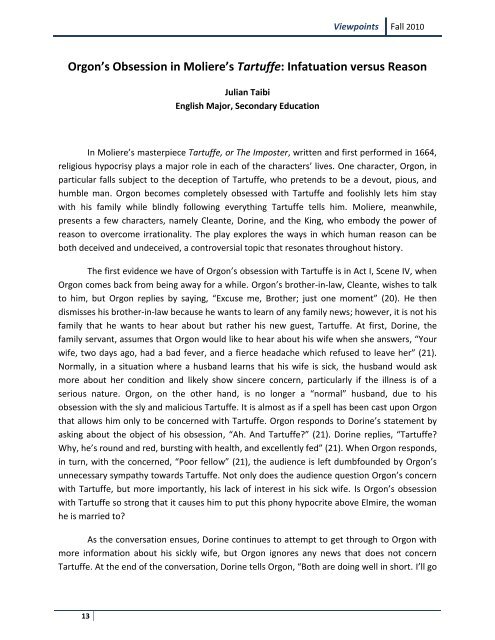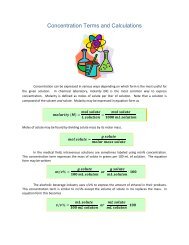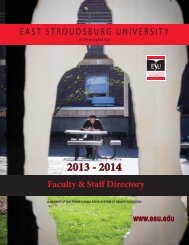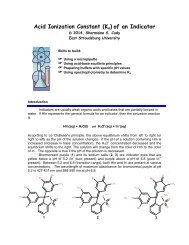Orgon's Obsession in Moliere's Tartuffe
Orgon's Obsession in Moliere's Tartuffe
Orgon's Obsession in Moliere's Tartuffe
You also want an ePaper? Increase the reach of your titles
YUMPU automatically turns print PDFs into web optimized ePapers that Google loves.
13<br />
Viewpo<strong>in</strong>ts Fall 2010<br />
Orgon’s <strong>Obsession</strong> <strong>in</strong> Moliere’s <strong>Tartuffe</strong>: Infatuation versus Reason<br />
Julian Taibi<br />
English Major, Secondary Education<br />
In Moliere’s masterpiece <strong>Tartuffe</strong>, or The Imposter, written and first performed <strong>in</strong> 1664,<br />
religious hypocrisy plays a major role <strong>in</strong> each of the characters’ lives. One character, Orgon, <strong>in</strong><br />
particular falls subject to the deception of <strong>Tartuffe</strong>, who pretends to be a devout, pious, and<br />
humble man. Orgon becomes completely obsessed with <strong>Tartuffe</strong> and foolishly lets him stay<br />
with his family while bl<strong>in</strong>dly follow<strong>in</strong>g everyth<strong>in</strong>g <strong>Tartuffe</strong> tells him. Moliere, meanwhile,<br />
presents a few characters, namely Cleante, Dor<strong>in</strong>e, and the K<strong>in</strong>g, who embody the power of<br />
reason to overcome irrationality. The play explores the ways <strong>in</strong> which human reason can be<br />
both deceived and undeceived, a controversial topic that resonates throughout history.<br />
The first evidence we have of Orgon’s obsession with <strong>Tartuffe</strong> is <strong>in</strong> Act I, Scene IV, when<br />
Orgon comes back from be<strong>in</strong>g away for a while. Orgon’s brother-<strong>in</strong>-law, Cleante, wishes to talk<br />
to him, but Orgon replies by say<strong>in</strong>g, “Excuse me, Brother; just one moment” (20). He then<br />
dismisses his brother-<strong>in</strong>-law because he wants to learn of any family news; however, it is not his<br />
family that he wants to hear about but rather his new guest, <strong>Tartuffe</strong>. At first, Dor<strong>in</strong>e, the<br />
family servant, assumes that Orgon would like to hear about his wife when she answers, “Your<br />
wife, two days ago, had a bad fever, and a fierce headache which refused to leave her” (21).<br />
Normally, <strong>in</strong> a situation where a husband learns that his wife is sick, the husband would ask<br />
more about her condition and likely show s<strong>in</strong>cere concern, particularly if the illness is of a<br />
serious nature. Orgon, on the other hand, is no longer a “normal” husband, due to his<br />
obsession with the sly and malicious <strong>Tartuffe</strong>. It is almost as if a spell has been cast upon Orgon<br />
that allows him only to be concerned with <strong>Tartuffe</strong>. Orgon responds to Dor<strong>in</strong>e’s statement by<br />
ask<strong>in</strong>g about the object of his obsession, “Ah. And <strong>Tartuffe</strong>?” (21). Dor<strong>in</strong>e replies, “<strong>Tartuffe</strong>?<br />
Why, he’s round and red, burst<strong>in</strong>g with health, and excellently fed” (21). When Orgon responds,<br />
<strong>in</strong> turn, with the concerned, “Poor fellow” (21), the audience is left dumbfounded by Orgon’s<br />
unnecessary sympathy towards <strong>Tartuffe</strong>. Not only does the audience question Orgon’s concern<br />
with <strong>Tartuffe</strong>, but more importantly, his lack of <strong>in</strong>terest <strong>in</strong> his sick wife. Is Orgon’s obsession<br />
with <strong>Tartuffe</strong> so strong that it causes him to put this phony hypocrite above Elmire, the woman<br />
he is married to?<br />
As the conversation ensues, Dor<strong>in</strong>e cont<strong>in</strong>ues to attempt to get through to Orgon with<br />
more <strong>in</strong>formation about his sickly wife, but Orgon ignores any news that does not concern<br />
<strong>Tartuffe</strong>. At the end of the conversation, Dor<strong>in</strong>e tells Orgon, “Both are do<strong>in</strong>g well <strong>in</strong> short. I’ll go
14<br />
Viewpo<strong>in</strong>ts Fall 2010<br />
and tell Madame that you’ve expressed keen sympathy and anxious <strong>in</strong>terest” (Moliere 23).<br />
Through this statement, we can see that Dor<strong>in</strong>e is just as puzzled as the audience is and that<br />
she can do noth<strong>in</strong>g but laugh <strong>in</strong> utter disbelief at the hypnotized Orgon.<br />
What does Orgon f<strong>in</strong>d so magnificent about <strong>Tartuffe</strong> that causes him to display such an<br />
<strong>in</strong>fatuation? The playwright answers this question <strong>in</strong> Act I, Scene V, when Orgon recollects the<br />
first time he met <strong>Tartuffe</strong>. Although Orgon offers a reason both for his <strong>in</strong>terest and for his belief<br />
as to why <strong>Tartuffe</strong> seems like such a religious and humble man, the audience can see that his<br />
judgment is extremely weak. Orgon attempts to expla<strong>in</strong>s his <strong>in</strong>terest <strong>in</strong> <strong>Tartuffe</strong>—“He *<strong>Tartuffe</strong>+<br />
is a man who…a man who…an excellent man” (25)—and <strong>in</strong> his stutter<strong>in</strong>g statement, we can see<br />
how Orgon has lost his ability to rationally evaluate anyth<strong>in</strong>g at all. What Orgon says next is<br />
extremely irrational. He comments, “My mother, children, brother, and wife could die, and I’d<br />
not feel a s<strong>in</strong>gle moment’s pa<strong>in</strong>” (25). After Orgon makes this claim, the audience likely expects<br />
him to come to his senses and realize the severity of tell<strong>in</strong>g his brother-<strong>in</strong>-law that he would<br />
feel noth<strong>in</strong>g if his family died. However, Orgon cont<strong>in</strong>ues to justify his th<strong>in</strong>k<strong>in</strong>g, ignor<strong>in</strong>g the<br />
sarcasm of Cleante’s comment, “That’s a f<strong>in</strong>e sentiment, Brother; most humane” (25). By<br />
free<strong>in</strong>g his soul “from earthly loves, and every human tie,” Orgon is almost try<strong>in</strong>g to become a<br />
missionary figure <strong>in</strong> his obsession with <strong>Tartuffe</strong>, putt<strong>in</strong>g aside his own earthly cares <strong>in</strong> favor of<br />
what he perceives to be more spiritual matters: the person of <strong>Tartuffe</strong> himself. Orgon believes<br />
that <strong>Tartuffe</strong> is a sa<strong>in</strong>t because he flaunts his humbleness around the church while publicly<br />
perform<strong>in</strong>g m<strong>in</strong>or tasks <strong>in</strong> church, often pray<strong>in</strong>g loudly, and how modest he is when accept<strong>in</strong>g<br />
only small gifts. It is obvious to all of the other characters and to the audience as well that<br />
<strong>Tartuffe</strong> merely uses religious acts <strong>in</strong> order to appear religious himself. It almost seems as if<br />
Orgon is jok<strong>in</strong>g when he says, “Last week, his *<strong>Tartuffe</strong>’s] conscience was severely pricked<br />
because, while he was pray<strong>in</strong>g, he had caught a flea and killed it, so he felt, too wrathfully”<br />
(Moliere 26). However, Orgon simply reveals his own misguided fixation on <strong>Tartuffe</strong>’s apparent<br />
unassailable goodness.<br />
Cleante then makes a remark that caused much controversy <strong>in</strong> Versailles and<br />
throughout France <strong>in</strong> 1664 when the play was first performed. He replies, “There’s a vast<br />
difference, so it seems to me, between true piety and hypocrisy: How do you fail to see it, may I<br />
ask? Is not a face quite different than a mask?” (27). This remark is perhaps the essence of<br />
Moliere’s motivation for writ<strong>in</strong>g this play. In the 1660s <strong>in</strong> the official French royal court of<br />
Versailles and throughout France, there were more than a few highly prom<strong>in</strong>ent and<br />
supposedly religious and pious people <strong>in</strong> power that Moliere could clearly see were hypocrites<br />
and not people of God with pure <strong>in</strong>tentions. Moliere endeavored to expose these deceptive<br />
authorities or at least provoke questions with<strong>in</strong> his audience. Also, s<strong>in</strong>ce Moliere wrote dur<strong>in</strong>g<br />
the beg<strong>in</strong>n<strong>in</strong>g of the Age of Reason, people were beg<strong>in</strong>n<strong>in</strong>g to demand adherence to common<br />
sense <strong>in</strong> decision-mak<strong>in</strong>g and behavior that was rational. As the character Orgon displays hardly
15<br />
Viewpo<strong>in</strong>ts Fall 2010<br />
any common sense at all and, at the same time, is speak<strong>in</strong>g primarily about Christianity, people<br />
rioted and some authorities demanded that the play be banned on the basis that Moliere had<br />
ridiculed both religious and secular authorities for their lack of piety and absence of reason.<br />
We can see a perfect example of the comb<strong>in</strong>ation of the absences of these two<br />
qualities—piety and reason—when Cleante says, “Good God, man! Have you lost your common<br />
sense?” (26). Because Orgon follows what seem to be the tenets of Christianity, and at the<br />
same time his character portrays a person lack<strong>in</strong>g reason and rationality, some audience<br />
members misconstrued Moliere’s message and assumed that the playwright had argued that<br />
Christianity was synonymous with a lack of the ability to reason with clarity and <strong>in</strong>telligence. In<br />
his 1963 article “<strong>Tartuffe</strong>, Religion, and Courtly Culture,” published <strong>in</strong> French Historical Studies,<br />
Emanuel Chill addresses how the dévots, the followers of Card<strong>in</strong>al Pierre de Berulle, found the<br />
play extremely offensive. Chill expla<strong>in</strong>s that the orig<strong>in</strong>al version of the play was probably even a<br />
lot stronger <strong>in</strong> its social criticism than the versions we have today. Reflect<strong>in</strong>g on the content of<br />
the orig<strong>in</strong>al version and the decision mak<strong>in</strong>g process of the theatre company to edit the work,<br />
Chill notes, “it is clear that the surviv<strong>in</strong>g remnant of the Company was moved to exert great<br />
pressure aga<strong>in</strong>st <strong>Tartuffe</strong>, and that its ‘excitation’ resulted <strong>in</strong> the royal prohibition of its public<br />
performance” (Chill 155). Thus, <strong>in</strong> 1664, the play was banned because of the bad effect it<br />
produced <strong>in</strong> challeng<strong>in</strong>g authority. In his PMLA essay “<strong>Tartuffe</strong> and the Mysteries” (1977),<br />
Marcel Gutwirth states, “The challenge laid down by the comedy of <strong>Tartuffe</strong> was of a<br />
magnitude the age could not afford to ignore. Moliere’s plea for the purity of the play’s<br />
<strong>in</strong>tentions had been swept aside with the gruff retort: ‘It is not the bus<strong>in</strong>ess of the stage to be<br />
preach<strong>in</strong>g the Gospel’” (Gutwirth 36).<br />
Orgon’s obsession with <strong>Tartuffe</strong> reaches its climax <strong>in</strong> Act III when Damis, Orgon’s son,<br />
attempts to uncover <strong>Tartuffe</strong>’s true face. As Damis listens to <strong>Tartuffe</strong>’s advances on Elmire, he<br />
cannot help himself and bursts out of hid<strong>in</strong>g <strong>in</strong> order to prove <strong>Tartuffe</strong>’s treachery. When<br />
Orgon arrives on the scene, however, Orgon acts <strong>in</strong> the same irrational, absurd way that def<strong>in</strong>es<br />
his character thus far <strong>in</strong> the play. He is now completely deceived, which plays <strong>in</strong>to the hands of<br />
<strong>Tartuffe</strong> perfectly. Instead of deny<strong>in</strong>g the accusations, <strong>Tartuffe</strong> ma<strong>in</strong>ta<strong>in</strong>s his pious posture and<br />
then over-exaggerates the role of a s<strong>in</strong>ner. <strong>Tartuffe</strong> says, “Yes Brother, I’m a wicked man, I fear:<br />
a wretched s<strong>in</strong>ner, all depraved and twisted, the greatest villa<strong>in</strong> that has ever existed” (97). This<br />
moment <strong>in</strong> the play is ironic because <strong>Tartuffe</strong> actually admits to his wrongdo<strong>in</strong>g, but s<strong>in</strong>ce<br />
Orgon bl<strong>in</strong>dly believes that <strong>Tartuffe</strong> can do no evil, he refuses to listen to the accusation and<br />
consequently turns on his own son, Damis. Orgon has become so obsessed with the notion of<br />
<strong>Tartuffe</strong>’s sa<strong>in</strong>tly piety that he kicks Damis out of his house – hardly an act that would come<br />
from a religious, or even a sane person. Orgon ends the scene by say<strong>in</strong>g to Damis, “Well go<br />
quickly then. I dis<strong>in</strong>herit you; an empty purse is all you’ll get from me – except my curse!” (102).
16<br />
Viewpo<strong>in</strong>ts Fall 2010<br />
In Act IV, Elmire devises a plan <strong>in</strong> which Orgon will hide under a table while she and<br />
<strong>Tartuffe</strong> have a conversation that will expose <strong>Tartuffe</strong>’s hypocrisy. It is the ultimate plan—one<br />
based on the age-old adage that “see<strong>in</strong>g is believ<strong>in</strong>g”—to put a f<strong>in</strong>al stop to Orgon’s mad<br />
obsession with the false fiend. With a little conv<strong>in</strong>c<strong>in</strong>g, Elmire causes <strong>Tartuffe</strong> to come onto her<br />
once aga<strong>in</strong> <strong>in</strong> a sexual advance, thereby prov<strong>in</strong>g that he is a fraud. However, <strong>in</strong> Act IV, Scene V,<br />
Moliere’s humor is quite apparent as Elmire coughs several times, warn<strong>in</strong>g her husband that he<br />
should come out of hid<strong>in</strong>g immediately and reprimand <strong>Tartuffe</strong>. Because of his bl<strong>in</strong>d faith <strong>in</strong><br />
<strong>Tartuffe</strong>, though, Orgon still refuses to believe what he hears and does not come out after the<br />
first or even second time his wife coughs. <strong>Tartuffe</strong>’s hypocrisy must be fully exposed <strong>in</strong> order<br />
for Orgon to work his way out from under the table. When he f<strong>in</strong>ally comes out of hid<strong>in</strong>g, he<br />
exclaims, “That man’s a perfect monster, I must admit! I’m simply stunned. I can’t get over it”<br />
(129).<br />
Although the play focuses on <strong>Tartuffe</strong>’s deception of Orgon, <strong>Tartuffe</strong> greatly affects the<br />
other characters of the play. Cleante, who represents the voice of rationality and reason<br />
throughout the play, is constantly <strong>in</strong> a struggle to help Orgon come to his senses. In Scene 1,<br />
Act IV, as Cleante talks with <strong>Tartuffe</strong>, Cleante uses logic to po<strong>in</strong>t out the hypocrisies of<br />
<strong>Tartuffe</strong>’s actions. Cleante argues, “Your reason<strong>in</strong>g is badly warped and stretched, and these<br />
excuses, Sir, are most far-fetched” (110). As <strong>Tartuffe</strong> tries to justify his tak<strong>in</strong>g Damis’s money<br />
and estate, he expostulates, “Lest so much wealth fall <strong>in</strong>to wicked hands, lest those to whom it<br />
might descend <strong>in</strong> time turn it to purposes of s<strong>in</strong> and crime” (111). This quote, of course, is<br />
extremely ironic: There can be no more wicked hands that the money could fall <strong>in</strong>to than<br />
<strong>Tartuffe</strong>’s. Cleante then reasons that Damis, be<strong>in</strong>g Orgon’s son, should be the first <strong>in</strong> control of<br />
the family’s money, and also, po<strong>in</strong>ts that it is not a pious action to be the cause of a son’s<br />
dis<strong>in</strong>heritance. Cleante advances the argument skillfully by evok<strong>in</strong>g the pr<strong>in</strong>ciple of piety, “Does<br />
true religion teach that lawful heirs may freely be deprived of what is theirs?” (112). Cleante’s<br />
po<strong>in</strong>t is valid, especially given that <strong>Tartuffe</strong> has no claim to the family’s wealth and is merely a<br />
stranger who manipulates those around him. Cleante’s logical reason<strong>in</strong>g proves to be<br />
overwhelm<strong>in</strong>g, and consequently, <strong>Tartuffe</strong> <strong>in</strong>terrupts him to say that he has “certa<strong>in</strong> pious<br />
duties to attend to” (112), thus leav<strong>in</strong>g the scene. <strong>Tartuffe</strong> realizes that his scheme is <strong>in</strong> danger<br />
and thus makes this hypocritical statement to escape the power of reason.<br />
Through the character of Cleante, Moliere expresses his own view of true Christian<br />
virtue as opposed to religious hypocrisy. Cleante expla<strong>in</strong>s to Orgon that many people lead lives<br />
of virtue but they do not constantly need to prove to everyone how devout they are. He makes<br />
the po<strong>in</strong>t that truly religious people do not make a big show, not<strong>in</strong>g, “True piety isn’t hard to<br />
recognize…their virtue is acknowledged; who could doubt it? But you won’t hear them beat the<br />
drum about it. They’re never ostentatious, never va<strong>in</strong>, and their religion’s moderate and<br />
humane” (29). Towards the end of the play, Cleante demonstrates his deep devotion to
17<br />
Viewpo<strong>in</strong>ts Fall 2010<br />
Christianity, especially the value of forgiveness. When Orgon learns of <strong>Tartuffe</strong>’s arrest, he<br />
expresses his desire to see him suffer for his crimes of betrayal. However, the ever consistent<br />
Cleante po<strong>in</strong>ts out that he should not seek revenge on the double crosser, but rather should<br />
hope that <strong>Tartuffe</strong> repents for his s<strong>in</strong>s and receives mercy from the K<strong>in</strong>g. Through the character<br />
of Cleante we can see how true Christianity and rationality work so well together and can be <strong>in</strong><br />
harmony <strong>in</strong> the age of reason, which is, likely, Moliere’s central position, one which his<br />
contemporary critics refused to accept.<br />
Although Moliere portrays Cleante as the voice of reason and rationality, Cleante is<br />
ma<strong>in</strong>ly <strong>in</strong>effective <strong>in</strong> mak<strong>in</strong>g Orgon see the truth about <strong>Tartuffe</strong>. In her short 2001 essay<br />
“Moliere’s <strong>Tartuffe</strong>” published <strong>in</strong> the Explicator, Pamela S. Saur argues that without the other<br />
characters, especially Elmire, the end<strong>in</strong>g of the play would be quite different <strong>in</strong> that <strong>Tartuffe</strong><br />
would be victorious over Cleante <strong>in</strong> the struggle to guide Orgon. Saur states, “Cleante's rhetoric<br />
and reason<strong>in</strong>g are ignored and even ridiculed by Orgon and his mother, Madame Pernelle; only<br />
the drastic wiles of Elmire, who gets <strong>Tartuffe</strong> to try to seduce her while her husband, Orgon,<br />
hides under the table, are effective <strong>in</strong> persuad<strong>in</strong>g Orgon of the truth” (Saur 9). The other<br />
characters that are considered the “good” allies of the play, except for Elmire, are also<br />
ultimately unsuccessful <strong>in</strong> help<strong>in</strong>g to uncover <strong>Tartuffe</strong>’s true identity.<br />
We can see further that Moliere <strong>in</strong>sists that class has little to do with <strong>in</strong>tellect as Dor<strong>in</strong>e<br />
has more sense and reason than Orgon. Even though she is <strong>in</strong>ferior <strong>in</strong> terms of social position,<br />
she is superior <strong>in</strong> <strong>in</strong>telligence and is able to see through the hypocrisy and two-facedness of<br />
<strong>Tartuffe</strong>. Dor<strong>in</strong>e is also not just a servant to Mariane but an honest companion as well.<br />
However, although it seems that Dor<strong>in</strong>e, be<strong>in</strong>g the sharp and witty lady’s maid that she is, has a<br />
good chance of remov<strong>in</strong>g <strong>Tartuffe</strong> from his seat of power <strong>in</strong> the household, she only succeeds <strong>in</strong><br />
sav<strong>in</strong>g the relationship between Mariane and Valere. Through the character of Dor<strong>in</strong>e, Moliere<br />
makes sure that we have the right perspective. She is a realist who sees clearly and directly <strong>in</strong>to<br />
the truth of what is transpir<strong>in</strong>g between <strong>Tartuffe</strong> and Orgon.<br />
Orgon’s stubbornness, nonetheless, proves too strong for the cleverness of Dor<strong>in</strong>e, the<br />
wisdom of Cleante, and even the persuasion of his own son Damis. Even though Cleante and<br />
Damis have the same goal of help<strong>in</strong>g Orgon to come to his senses, Cleante represents wisdom<br />
and reason while Damis, through his youth and passion, is impetuous and hot-headed,<br />
threaten<strong>in</strong>g to cut <strong>Tartuffe</strong>’s life short. Cleante responds to this threat by identify<strong>in</strong>g Damis’s<br />
behavior as merely the ignorance of young, impulsive manhood: “What a display of young<br />
hotheadedness! Do learn to moderate your fits of rage. In this just k<strong>in</strong>gdom, this enlightened<br />
age, one does not settle th<strong>in</strong>gs by violence” (140). Through this remark, we can see the Age of<br />
Reason <strong>in</strong> Cleante’s his measured, astute words.
18<br />
Viewpo<strong>in</strong>ts Fall 2010<br />
In contrast to Cleante, Madame Pernelle, Orgon’s mother, represents irrationality with<br />
an unforgiv<strong>in</strong>g and judgmental attitude disguised as religious morality. In the open<strong>in</strong>g scene of<br />
the play, she leaves Orgon’s home because she does not approve of the household members’<br />
negative view of <strong>Tartuffe</strong>. Madame Pernelle asserts angrily, “And [<strong>Tartuffe</strong>] practices precisely<br />
what he preaches. He’s a f<strong>in</strong>e man, and should be listened to. I will not hear him mocked by<br />
fools like you” (10). She also criticizes everyone for their “promiscuous enterta<strong>in</strong><strong>in</strong>g” which she<br />
views as immoral although the audience understands that this is just normal socialization. Even<br />
towards the end of the play when Orgon tells her that <strong>Tartuffe</strong> has tried to seduce his wife,<br />
Madame Pernelle does not believe him and still <strong>in</strong>sists that <strong>Tartuffe</strong> is a good religious man. As<br />
is this case with Orgon, the f<strong>in</strong>al antidote to unreason is not reason itself but see<strong>in</strong>g the truth<br />
first-hand. It is only when <strong>Tartuffe</strong> has taken Orgon’s property and tries to have him arrested<br />
that Madame Pernelle f<strong>in</strong>ally comprehends the despicable character that <strong>Tartuffe</strong> really is.<br />
Although Madame Pernelle is not proactively evil, she enables <strong>Tartuffe</strong> to successfully deceive<br />
her son.<br />
Two other victims of <strong>Tartuffe</strong>’s hypocritical actions <strong>in</strong>clude Mariane and Valere, lovers<br />
who struggle with their relationship due to Orgon’s deception and his break<strong>in</strong>g off of their<br />
marriage. At one po<strong>in</strong>t, Mariane is so horrified by the idea of hav<strong>in</strong>g to marry <strong>Tartuffe</strong> that she<br />
tells Dor<strong>in</strong>e, “I’ll kill myself, if I’m forced to wed that man” (54). Near the end of the play, Valere<br />
courageously does everyth<strong>in</strong>g <strong>in</strong> his power to save Orgon from be<strong>in</strong>g arrested by br<strong>in</strong>g<strong>in</strong>g him a<br />
carriage and money with which to escape. Although Orgon is eventually cleared of the charges<br />
and does not need Valere’s help, he is extremely grateful and makes the announcement that he<br />
will arrange Valere’s marriage to Mariane. Here we can see that Valere’s true friendship and<br />
loyalty are contrasted with the false friendship of <strong>Tartuffe</strong>. Furthermore, Valere’s authentic and<br />
admirable love for Mariane contrasts with <strong>Tartuffe</strong>’s lust for Elmire, which leads to his ultimate<br />
downfall.<br />
A number of critics have discussed the unusual role of the K<strong>in</strong>g <strong>in</strong> the play as a center of<br />
correct authority with<strong>in</strong> the larger treatment of reason and irrationality. For <strong>in</strong>stance, <strong>in</strong> his<br />
1955 article “Moliere and the Historian of French Society,” Leon Bernard states,<br />
The heroes of tragedy, Moliere said, could be drawn accord<strong>in</strong>g to the fancy of the<br />
playwright, but the writer of comedy must be close to life. ‘The purpose of comedy,’<br />
he has one of his characters say, ‘is to represent all the defects of men and<br />
particularly those of the present age.’ No class, no profession was spared <strong>in</strong> Moliere’s<br />
plays; only the person of the K<strong>in</strong>g was sacrosanct (Bernard 530).<br />
The character of the K<strong>in</strong>g is vital to the resolution of this play, although he is not a speak<strong>in</strong>g<br />
character or a visible presence on stage. Just when Orgon is about to be arrested, a gentleman
19<br />
Viewpo<strong>in</strong>ts Fall 2010<br />
of the K<strong>in</strong>g’s guard is sent to tell Orgon that the K<strong>in</strong>g has pardoned him and will restore his<br />
wealth and property due to Orgon’s prior service, fight<strong>in</strong>g loyally for the K<strong>in</strong>g <strong>in</strong> the civil wars.<br />
Moliere uses the appearance of the K<strong>in</strong>g at the end of the play to further emphasize that <strong>in</strong> the<br />
end, loyalty will be rewarded and betrayal punished.<br />
Many critics, however, see the <strong>in</strong>troduction of the K<strong>in</strong>g as an artificial means of external<br />
resolution. In “Dramatic Justice <strong>in</strong> <strong>Tartuffe</strong>,” Elsa V<strong>in</strong>eberg states,<br />
The K<strong>in</strong>g’s justice, it is argued, may be thorough and effective, but it is so unexpected<br />
as to cast doubt upon the dramatic coherence of the entire comedy. Probably, Moliere<br />
himself is responsible for this reaction, hav<strong>in</strong>g resorted to a deus ex mach<strong>in</strong>a that<br />
appears to defy <strong>in</strong>ternal resolution. By rely<strong>in</strong>g on a device which <strong>in</strong>troduces a new<br />
character possessed of sweep<strong>in</strong>g powers, he seems to be say<strong>in</strong>g that there is a break<br />
between dramatically motivated expectations of justice and the K<strong>in</strong>g’s own dazzl<strong>in</strong>g<br />
display of power and omniscience (V<strong>in</strong>eberg 583).<br />
Hav<strong>in</strong>g the K<strong>in</strong>g resolve everyth<strong>in</strong>g <strong>in</strong> his grand and powerful manner was seen by many <strong>in</strong> the<br />
seventeenth century and by critics today as Moliere’s appeasement of the aristocracy and the<br />
K<strong>in</strong>g himself <strong>in</strong> the hope of lessen<strong>in</strong>g the st<strong>in</strong>g of his satirical portrayal of religious hypocrisy.<br />
The K<strong>in</strong>g, <strong>in</strong> his wisdom and fairness, epitomizes the values of the age of reason.<br />
Moliere’s <strong>Tartuffe</strong> wrestles with issues of reason, irrationality, and obsession that we<br />
are still faced with today <strong>in</strong> 2010. Religious hypocrisy, as well as political hypocrisy, pervades<br />
our whole society, and <strong>in</strong> some form, presents itself <strong>in</strong> the news every day, often motivat<strong>in</strong>g<br />
contradictory and dangerous actions. We encounter so many false prophets and leaders <strong>in</strong> all<br />
sectors of our culture, and it is often difficult to tell the s<strong>in</strong>cere and genu<strong>in</strong>e from the masked<br />
and deceptive. We should still look for the simple virtues advocated by Moliere through the<br />
character of Cleante and always be will<strong>in</strong>g to look for the truth beh<strong>in</strong>d the facade.
20<br />
Works Cited<br />
Viewpo<strong>in</strong>ts Fall 2010<br />
Bernard, Leon. "Moliere and the Historian of French Society." The Review of Politics 17 (1955):<br />
530-544.<br />
Chill, Emanuel S. "<strong>Tartuffe</strong>, Religion, and Courtly Culture." French Historical Studies 3.2 (1963):<br />
151-183.<br />
Gutwirth, Marcel. "<strong>Tartuffe</strong> and the Mysteries." PMLA 92.1 (1977): 33-40.<br />
Moliere. <strong>Tartuffe</strong>. Trans. Richard Wilbur. New York: Mar<strong>in</strong>er, 1968.<br />
Saur, Pamela S. "<strong>Moliere's</strong> <strong>Tartuffe</strong>." Explicator 60.1 (2001): 9-12<br />
V<strong>in</strong>eberg, Elsa. "Dramatic Justice <strong>in</strong> <strong>Tartuffe</strong>." MLN 90.4 (1975): 583-590.








